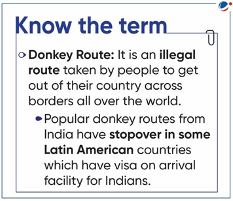Why in the news?
Gujarat Crime Investigation Department (CID) is probing the case of possible illegal immigration related to the Nicaragua-bound plane carrying Indians, which was grounded in France.
About Illegal Migration
- Illegal migration refers to trans-boundary migration of people from one country to another without valid documents, using illegal means.
- In Indian context, as per Citizenship Act, 1955, an illegal migrant is defined as, a foreigner who enters India,
- without a valid passport or other prescribed travel documents, or
- with a valid passport or other prescribed travel documents but remains in India beyond the permitted time period.
Reasons for illegal migration
- Economic Factors: These include poverty, lack of economic opportunities, stagnation of income, etc., that may force an individual or a group to look beyond their home country for better Economic opportunities.
- Better standard of living: Real or Perceived promise of better opportunities in destination countries.
- E.g., the promise of ‘The American Dream’ still attracts lot of migrants both legal and illegal towards U.S.A.
- Human Trafficking networks: Smuggling of migrants is a highly profitable illicit activity with a relatively low risk of detection.
- As of October 2023, 2925 illegal agents have been notified in India through the e-Migrate portal.
- Political and religious persecution: This has led to refugees and illegal immigrants from Tibet, Afghanistan, Sri Lanka, Myanmar, Pakistan, and Bangladesh finding shelter in India.
- Overpopulation: This may lead to crisis of living space. E.g. In countries like Bangladesh where high population density has led to illegal migration in North eastern States of India.
- Natural Disasters: This may force people to migrate for survival and better living conditions.
- E.g., Illegal migration from Sahel region of Africa due to frequent droughts.
- Frequent floods and cyclone in Bangladesh force migration of people to India.
- Existing Social Networks: Social networks established by previous migrants attract more migrants from similar communities, often resulting in migration through illegal routes in absence of other options.
Impacts of Illegal Migration
- Economic Exploitation: Illegal and undocumented migrants lack legal safeguard and thus are prone to informal, temporary or unprotected jobs and even forced labour.
- Violation of Human Rights: Illegal Migrants are vulnerable to multiple inhumane conditions and criminal offences like assault, rape or extortion during their arduous journeys or at the destination region.
- Risk of Detention and deportation: Illegal migrants face constant fear of being deported by the authorities and may also be mistreated during detention.
- E.g., Detention centers of US for illegal migrants, are often alleged to have poor living conditions impacting physical, mental, social health of detainees including children.
- Social Tensions: Large scale illegal migration may distort existing demography and pose a threat to existing socio-cultural identity.
- E.g. Threat to Assamese identity due to illegal migration from Bangladesh has given rise to various socio-political tensions in Assam.
- Facilitates Organized Crimes: Often organized criminal groups are involved in smuggling migrants across borders (e.g. US-Mexico Border).
Initiatives Taken to counter illegal migration
Global Initiatives
|
Challenges in Tackling Illegal Migration
- Lack of data: Centre in an affidavit filed in SC held that ‘clandestine and surreptitious’ manner of entry of illegal migrants makes it difficult to have an accurate data collection.
- Porous Borders: It facilitates the flow of illegal migrants across multiple countries using Donkey routes/flights.
- Poor regulation of travel agencies: It has led to cropping up of unscrupulous travel and placement agents running illegal operations, particularly in regions where demand for moving abroad is high.
- Coordination issues: Cross country dimension of international human trafficking networks requires extensive International cooperation of law enforcement agencies.
- Involvement of organized criminal groups: Organized criminals have established professional networks that transcend borders and encompass all regions.
- Legal shortcomings: Absence or inadequacy of national legislation to address the smuggling of migrants in many parts of the world.

Way Forward
- International Cooperation: Transnational nature of illegal migration mandates an institutional mechanism for cooperation, data exchange, safeguarding human rights etc. in context of Illegal migration.
- Combat human trafficking: Better coordination of law enforcement agencies under ambit of INTERPOL, to dismantle criminal networks behind human trafficking and migrant smuggling.
- Capacity development of local law enforcement: To detect and prevent illegal migration and safeguard migrants in vulnerable situations.
- Countering Organized crime: UNTOC can help in addressing the involvement of organized groups.
- Demarcate between Refugees and Illegal migrant: India, since ages has been a host to refugees fleeing politico-religious persecution.
- However, there is need to have a dedicated refugee policy to deal with them in a non-arbitrary manner.




